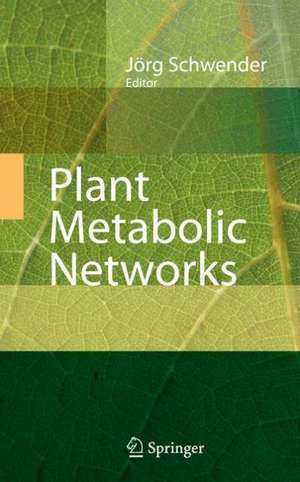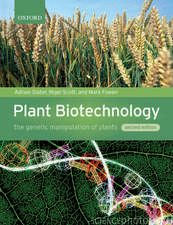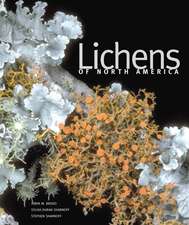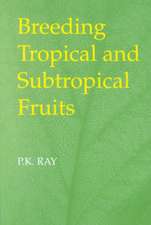Plant Metabolic Networks
Editat de Jörg Schwender Cuvânt înainte de Jacqueline V. Shanksen Limba Engleză Hardback – 29 mai 2009
In this book, recent advances in qualitative and quantitative analysis of metabolism are summarized to give an overview of the current state of knowledge. Principles of the analysis of network structure, flux analysis, and kinetic modeling are described. Analytical methods necessary to produce the data needed for metabolic flux analysis and for kinetic modeling are described. The analysis of larger metabolic networks is only possible by using computer assistance. Therefore each chapter of the book shall also describe software available for this purpose.
| Toate formatele și edițiile | Preț | Express |
|---|---|---|
| Paperback (1) | 947.18 lei 6-8 săpt. | |
| Springer – 23 aug 2016 | 947.18 lei 6-8 săpt. | |
| Hardback (1) | 952.09 lei 3-5 săpt. | |
| Springer – 29 mai 2009 | 952.09 lei 3-5 săpt. |
Preț: 952.09 lei
Preț vechi: 1161.08 lei
-18% Nou
Puncte Express: 1428
Preț estimativ în valută:
182.19€ • 194.82$ • 151.90£
182.19€ • 194.82$ • 151.90£
Carte disponibilă
Livrare economică 28 martie-11 aprilie
Preluare comenzi: 021 569.72.76
Specificații
ISBN-13: 9780387787442
ISBN-10: 0387787445
Pagini: 331
Ilustrații: XII, 339 p.
Dimensiuni: 155 x 235 x 23 mm
Greutate: 0.64 kg
Ediția:2009
Editura: Springer
Colecția Springer
Locul publicării:New York, NY, United States
ISBN-10: 0387787445
Pagini: 331
Ilustrații: XII, 339 p.
Dimensiuni: 155 x 235 x 23 mm
Greutate: 0.64 kg
Ediția:2009
Editura: Springer
Colecția Springer
Locul publicării:New York, NY, United States
Public țintă
ResearchCuprins
Definition of Plant Metabolic Networks.- Metabolite Measurements.- Enzyme Kinetics: Theory and Practice.- Quantification of Isotope Label.- Data Integration.- Topology of Plant Metabolic Networks.- Network Stoichiometry.- Isotopic Steady-State Flux Analysis.- Application of Dynamic Flux Analysis in Plant Metabolic Networks.- Kinetic Properties of Metabolic Networks.
Notă biografică
Jörg Schwender received his Ph.D. in Biology in 1999 from the University of Karlsruhe / Germany. He is currently associate scientist in the biology department of Brookhaven National Laboratory, New York, USA. His main research interests are metabolic flux analysis and related approaches of modeling and analysis of metabolic networks in plants.
Textul de pe ultima copertă
Plant Metabolic Networks
Edited by Jörg Schwender
Plants are the basis for human nutrition and are of increasing interest for the chemical industry as a source of chemical feed stocks. Fuels derived from plant biomass will increasingly replace fossil fuels in the future. In order to increase crop productivity, design new plant products, and create new energy crops, there is need for methods of qualitative and quantitative analysis of metabolism which are able to guide the rational re-design of metabolic networks.
In Plant Metabolic Networks recent advances in qualitative and quantitative analysis of metabolism are summarized to give an overview of the current state of knowledge. The book can be divided into three parts: First an introductory chapter (chapter 2), relating to the unique complexity of plant metabolism. The following three chapters describe how to analyze the components that make up the metabolic network, metabolites and enzymes. Finally, chapters 6 to 11 are devoted to network analysis and modeling. Contributions from different expert authors have been assembled to give a current view on plant metabolic networks, from the analysis of the molecular parts to approaches of mathematical modeling of plant metabolic networks at the cellular level.
Jörg Schwender received his Ph.D. in Biology in 1999 from the University of Karlsruhe / Germany. He is currently associate scientist in the biology department of Brookhaven National Laboratory, New York, USA. His main research interests are metabolic flux analysis and related approaches of modeling and analysis of metabolic networks in plants.
Edited by Jörg Schwender
Plants are the basis for human nutrition and are of increasing interest for the chemical industry as a source of chemical feed stocks. Fuels derived from plant biomass will increasingly replace fossil fuels in the future. In order to increase crop productivity, design new plant products, and create new energy crops, there is need for methods of qualitative and quantitative analysis of metabolism which are able to guide the rational re-design of metabolic networks.
In Plant Metabolic Networks recent advances in qualitative and quantitative analysis of metabolism are summarized to give an overview of the current state of knowledge. The book can be divided into three parts: First an introductory chapter (chapter 2), relating to the unique complexity of plant metabolism. The following three chapters describe how to analyze the components that make up the metabolic network, metabolites and enzymes. Finally, chapters 6 to 11 are devoted to network analysis and modeling. Contributions from different expert authors have been assembled to give a current view on plant metabolic networks, from the analysis of the molecular parts to approaches of mathematical modeling of plant metabolic networks at the cellular level.
Jörg Schwender received his Ph.D. in Biology in 1999 from the University of Karlsruhe / Germany. He is currently associate scientist in the biology department of Brookhaven National Laboratory, New York, USA. His main research interests are metabolic flux analysis and related approaches of modeling and analysis of metabolic networks in plants.
Caracteristici
Gives a comprehensive overview into different aspects of quantitative analysis of metabolic networks in plants Discusses the recent advances in and the current state of plant metabolic networks










